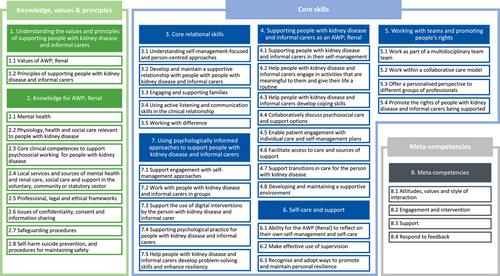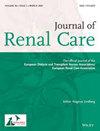Development of a competency framework for the Assistant Wellbeing Practitioner (Renal) role
Abstract
Background
Many people with kidney disease experience comorbid mental health difficulties that result in worse physical health outcomes alongside greater personal, treatment and societal costs.
Problem
Workforce expansion to treat comorbid mental health difficulties has focussed on psychological practitioners. This fails to capitalise on benefits arising from embedding roles to address biopsychosocial outcomes directly within the renal specialty. A competency framework to inform development and training for such a role has not been developed.
Methods
Five-phase process to develop a competency framework for an Assistant Wellbeing Practitioner (Renal) role. Following identification of competency frameworks for roles in psychological practice, health and social care, relevant competencies were synthesised to create a draft competency framework. This framework was revised through consultation events with professionals associated with the renal specialty and Kidney Patient Involvement Network with the framework informing a competency map.
Results
The competency map comprised three categories—Knowledge, Values and Principles, Core Skills and Meta-Competencies with specific competencies for an assistant practitioner role to work within the renal specialty identified. Core knowledge and skills included awareness of kidney treatments and common psychosocial difficulties, collaborative care and supporting evidence-based prevention approaches.
Conclusions
Competencies associated with the Assistant Wellbeing Practitioner (Renal) role have the potential to promote mental wellbeing, better physical health and generate social and economic benefits. The competency map can inform training and role evaluation, although addressing implementation issues associated with commissioning physical and mental healthcare is required.


 求助内容:
求助内容: 应助结果提醒方式:
应助结果提醒方式:


